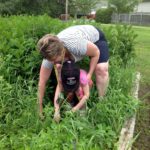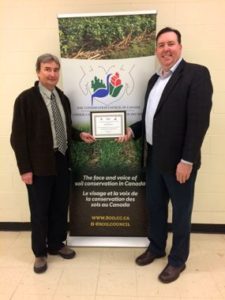July 26, 2018 – With all the excitement of soiling your undies this spring as part of the Soil Conservation Council of Canada’s (SCCC) Soil Your Undies campaign, you may have forgotten that it’s a two part experiment. It’s now time to go back into your garden, field or flower bed and dig up those cotton undergarments. We hope you marked that location with a flag or else it might take a few tries to uncover them.
“The Council was thrilled by the amount of interest in Soil Your Undies this year,” says SCCC chair, Alan Kruszel. “From coast-to-coast, Canadians garnered a greater appreciation for the precious resource right under their feet by burying a pair of undies on their own. We can’t wait to see the results of all the underwear that will be unearthed in the next little while.”
During National Soil Conservation Week in April, the SCCC buried its official pair of Stanfield’s undies at the Canada Agriculture and Food Museum in Ottawa, and as predicted, there wasn’t much left but the elastic waistband on that pair of briefs – a key indicator of healthy, living soil. The official unearthing was all caught on camera and a video to show our own findings can be found at: http://soilcc.ca/soilyourundies/2017/soil-your-undies.php
“Soil Your Undies really helped people stop thinking of soil as dirt and start thinking of it as a living, breathing entity,” Kruszel, who was on hand to dig up SCCC’s undies says. “If you care for the soil, it will care for you. It’s time Canadians realize just how important soil is to our society. Not only does healthy soil provide us food, fuel and fibre, it also plays an essential role in maintaining fresh air, clean water, and extensive biodiversity. In fact, the future of our civilization will depend on how well we take care of this six inches of fragile soil.”
For those who dig up undies and find them not as deteriorated as they’d like, there are some steps you can take to try to improve the health of your soil.
- Have your soil tested by a reputable soil lab to understand important parameters such as pH and organic matter.
- Add organic material like manure, compost, or crop residues.
- Keep the soil covered with something living for as long as possible.
- Reduce tillage.
Be sure to share your experiments with us on social media by tagging @SoilCouncil or using the hashtag #SoilYourUndies. We hope all we see is a great deal of waistbands. If you didn’t get a pair in the ground yet, there’s still time. Follow our simple instructions at http://soilcc.ca/soilyourundies/2017/soil-your-undies.php to get started and let us know how it goes. Soiling your undies has never been more fun.







 The Soil Conservation Council of Canada (SCCC) has announced that Harold Rudy is the 2017 inductee to the Canadian Conservation Hall of Fame. He will be officially inducted at a ceremony on August 22, 2017, at the SCCC Summit on Canadian Soil Health in Guelph, Ontario.
The Soil Conservation Council of Canada (SCCC) has announced that Harold Rudy is the 2017 inductee to the Canadian Conservation Hall of Fame. He will be officially inducted at a ceremony on August 22, 2017, at the SCCC Summit on Canadian Soil Health in Guelph, Ontario. The Soil Conservation Council of Canada (SCCC) has announced that Mr. Adam Hayes is the 2016 winner of the L. B. Thomson Conservation Award. Mr. Hayes was presented with this honour by Alan Kruszel, Chair of the SCCC on January 4th at the SouthWest Agricultural Conference in Ridgetown, Ont.
The Soil Conservation Council of Canada (SCCC) has announced that Mr. Adam Hayes is the 2016 winner of the L. B. Thomson Conservation Award. Mr. Hayes was presented with this honour by Alan Kruszel, Chair of the SCCC on January 4th at the SouthWest Agricultural Conference in Ridgetown, Ont.